
Dev Anand was an Indian actor, writer, director and producer known for his work in Hindi cinema. Anand is considered as one of the greatest and most successful actors in the history of Indian cinema. Through a career that spanned over six decades, he worked in more than 100 films. Anand is a recipient of four Filmfare Awards, including two for Best Actor. The Government of India honoured him with Padma Bhushan, Indian third highest civilian honour in 2001 and with Dadasaheb Phalke Award in 2002.

Suraiya Jamal Sheikh, mononymously known as Suraiya, was an Indian actress and playback singer who worked in Hindi films. In a career spanning from 1936 to 1964, Suraiya acted in over 70 films and sang 338 songs. Regarded among the finest and greatest actresses in the history of Indian cinema, she was known for her strong on-screen portrayals. Suraiya was the most celebrated actress between the mid- to late 1940s and early 1950s and was paid more than her male counterparts.

The Guide is a 1958 novel written in English by the Indian author R. K. Narayan. Like most of his works, the events of this novel take place in Malgudi, a fictional town in South India. The novel describes the transformation of the protagonist, Raju, from a tour guide to a spiritual guide and then one of the greatest holy men of India.

Chetan Anand was a Bollywood film producer, screenwriter and director from India, whose first film, Neecha Nagar, was awarded the Grand Prix Prize at the first ever Cannes Film Festival in 1946. Later, he co-founded Navketan Films with his younger brother Dev Anand in 1949.

Haré Rama Haré Krishna is a 1971 Indian musical drama film directed by Dev Anand starring himself, Mumtaz and Zeenat Aman. The film was a hit and a star-making vehicle for Zeenat Aman, who played a westernized hippie, and won the Filmfare Best Supporting Actress Award, as well as the BFJA Award for Best Actress. The movie dealt with the decadence of the Hippie culture. It aimed to have an anti-drug message and also depicts some problems associated with Westernization such as divorce. It was influenced by the 1968 American psychedelic film Psych-Out.

Mirza Ghalib is a 1954 Indian Hindi and Urdu language biographical film, directed by Sohrab Modi. Based on the life of well-known poet Mirza Ghalib, the film was acclaimed upon release. It stars Bharat Bhushan as Ghalib and Suraiya as his tawaif lover, Moti Begum. The film won the President's Gold Medal for the All India Best Feature Film and the President's Silver Medal for Best Feature Film in Hindi in the 2nd National Film Awards for 1954. The film is also considered as one of Suraiya's best performance.
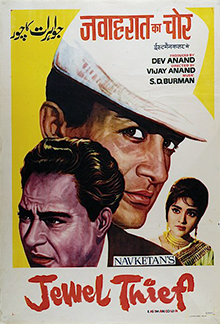
Jewel Thief is a 1967 Indian Hindi-language spy thriller heist film directed by Vijay Anand. The film stars Ashok Kumar, Dev Anand, Vyjayantimala and features four bond girl-like actresses portrayed by Tanuja, Helen, Faryal and Anju Mahendru, with Nazir Hussain and Sapru appearing in supporting roles. It was produced by Dev Anand's production house, Navketan Films. The film revolves around a jewellery expert (Anand), as he and the police attempt to capture a notorious jewel thief, but in the process, their true identities get thoroughly muddled.

Paying Guest is a 1957 Bollywood Romance drama film directed by Subodh Mukherjee. The film stars Dev Anand and Nutan along with Shubha Khote.

Guide is a 1965 Indian bilingual romantic drama film directed by Vijay Anand and produced by Dev Anand, who co-starred in the film with Waheeda Rehman. Based on R. K. Narayan's 1958 novel The Guide, the film narrates the story of Raj (Anand), a freelance tour guide and Rosie (Rehman), the repressed wife of a wealthy archaeologist.
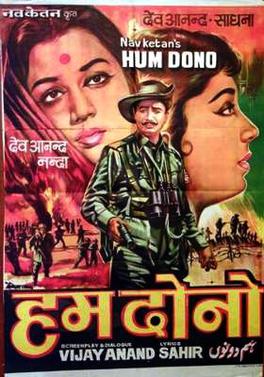
Hum Dono is a 1961 Hindi film produced by Dev Anand and Navketan films. Amarjeet is credited as the film's director, but producer and star Dev Anand claimed that it was his brother Vijay Anand, who directed the film, based on his own script. The film stars Dev Anand in a double role, and also has Sadhana, Nanda and Leela Chitnis.
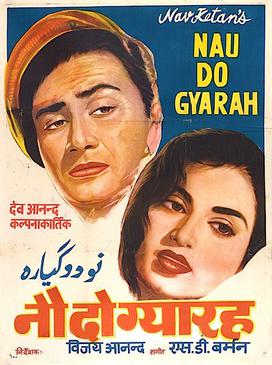
Nau Do Gyarah is a 1957 Indian Hindi-language comedy thriller film produced by Dev Anand. It also classifies as a road movie. This was his brother, Vijay Anand's directorial debut. The film stars Dev Anand, Kalpana Kartik, Madan Puri, Shashikala and Jeevan. The film's music is by S. D. Burman and the lyrics are by Majrooh Sultanpuri.

Anjada Gandu is a 1988 Indian Kannada-language romantic comedy film produced by B N Gangadhar under the banner of ANS Productions and written and directed by Renuka Sharma. The film stars Ravichandran Khushbu Devaraj and Rasi aliyas Shanthi in the lead roles along with Thoogudeepa Srinivas, Doddanna and Mukhyamantri Chandru in supporting roles. It is a remake of the 1984 Tamil film Thambikku Entha Ooru.

Aasaiyil Oru Kaditham is a 1999 Indian Tamil-language romantic drama film directed by Selva. The film stars Prashanth, Kausalya, Anand, and Chandni alongside an ensemble supporting cast including Vivek, Vijayakumar, Sathyapriya, Rajan P. Dev, and Santhana Bharathi. It is a remake of the Telugu film Snehithulu (1998). The music was composed by Deva with cinematography by K. S. Selvaraj and editing by Venkateswara Rao. The film was released on 17 December 1999.
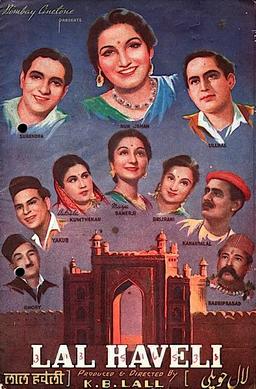
Lal Haveli is a Bollywood film. It was released on 15 December 1944. The film was directed by K. B. Lall, for whom it was a debut directorial venture. Lall had started his career playing a villain in Sohrab Modi's Bharosa (1940), and as a "storywriter" with the V. C. Desai directed film Radhika (1941), finally producing Savera (1942) directed by V. C. Desai, before turning his hand at direction with Lal Haveli.

Aaram is a 1951 Indian Hindi-language film directed by D. D. Kashyap and starring Dev Anand, Madhubala, Prem Nath and Talat Mahmood. While the film was not a major commercial success, it earned positive reviews from critics for the performances of Madhubala and Anand and the music composed by Anil Biswas.
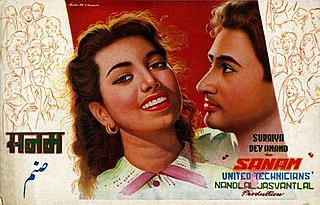
Sanam is a 1951 Bollywood romantic film directed by Nandlal Jaswantlal, who also directed the classic Anarkali. It starred Dev Anand, and his co-star was Suraiya, who also recorded the playback singing for the film. Meena Kumari acted in the film in a supporting role, where she played the role of Suraiya's best friend. The film was an average at the box office, which attributed to Suraiya's fading stardom in the early 1950s, and Madhubala's and Nargis' simultaneous rise as the top female stars.
Jeet is a 1949 Hindi drama film directed by Mohan Sinha and produced by Pratap A. Rana.

Kinare Kinare is a 1963 Indian Hindi-language film directed by Chetan Anand, who also plays a pivotal role. The film stars Dev Anand and Meena Kumari.

Barrister Babu is an Indian Hindi-language soap opera by Shashi Sumeet Productions, which broadcast on Colors TV. It aired from 11 February 2020 to 12 November 2021 and starred Pravisht Mishra, Aurra Bhatnagar Badoni and Anchal Sahu. A sequel, Durga Aur Charu, aired from 12 December 2022 to 14 April 2023, starred Rachi Sharma, Adrija Roy, and Kunal Jaisingh.
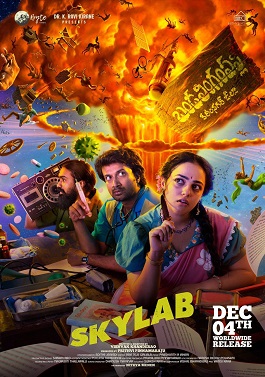
Skylab is a 2021 Indian Telugu-language period comedy drama film written and directed by debutant Vishvak Khanderao. Produced by Byte Features in association with Nithya Menen Company, the film stars Nithya Menen, Satya Dev and Rahul Ramakrishna. The plot follows fictitious incidents in a Telangana village preceding the disintegration of the American space station Skylab in 1979. The film traces the fear looming among the villagers in a comical manner in light of these developments.



















